 Before going off for Christmas I made a doomed attempt to buy second-hand books as presents, and succeeded only in buying myself a few slim tomes (although one of those, In Defence of War by Nigel Biggar, did turn out to be a present for my wife).
Before going off for Christmas I made a doomed attempt to buy second-hand books as presents, and succeeded only in buying myself a few slim tomes (although one of those, In Defence of War by Nigel Biggar, did turn out to be a present for my wife).2023-12-29
Kant's Dialectic
 Before going off for Christmas I made a doomed attempt to buy second-hand books as presents, and succeeded only in buying myself a few slim tomes (although one of those, In Defence of War by Nigel Biggar, did turn out to be a present for my wife).
Before going off for Christmas I made a doomed attempt to buy second-hand books as presents, and succeeded only in buying myself a few slim tomes (although one of those, In Defence of War by Nigel Biggar, did turn out to be a present for my wife).2023-12-27
Happy Christmas
 Happy Christmas, world, and any remaining readers I may have. I encourage you to leave festive greetings in the comments so that you may be, as is traditional, enumerated in this season. This year, unlike last, we are unstruck by Covid or similar and so are at my Mother's. I have done my Christmas Morning Half, beating my nephew (he blew up in Churchill) and retaining my smugness for another year. The end-of-year review will follow in a day or so.
Happy Christmas, world, and any remaining readers I may have. I encourage you to leave festive greetings in the comments so that you may be, as is traditional, enumerated in this season. This year, unlike last, we are unstruck by Covid or similar and so are at my Mother's. I have done my Christmas Morning Half, beating my nephew (he blew up in Churchill) and retaining my smugness for another year. The end-of-year review will follow in a day or so.2023-12-13
Introducing Justapedia?
 Well, that's what Quillette says. I suppose they hope to do better than the failed Conservapedia. They have
Well, that's what Quillette says. I suppose they hope to do better than the failed Conservapedia. They have If I look at their current "Selected Contents" I find Outline of the American Civil War, Underwater diving, Poetry, Polar regions of Earth, Machine learning, Mormons, Philosophy and Adoption. Only one of those has had any updates since their import from Wiki, and that is a trivial update of a date in a flagging. That's powerfully unimpressive.
I haven't quite worked out when the import was done, but it looks to be around November 2022. Quillette gives the impression that JP is recent.
Why would you even bother doing this? Q talks about "Recent Wikipedia Controversies" but it is rather telling that issue number one for them is where the funding went, not anything to do with content. Next up is Wikipedia:Arbitration/Requests/Case/World War II and the history of Jews in Poland, which was a thing but not that exciting (I didn't follow it). They then come to what I think is rather closer to their hearts, Race and intelligence and how it is controlled on Wiki. They may have a point; I would whinge about a variety of other articles and topics, if I felt like it. But... it all seems too thin to sustain what they want.
Notes
1. Well that sounded nice and dismissive, which is what I intended, but then I decided on a quick skim. The core content policy doesn't seem to significantly differ from what they imported; and the 5 pillars also seem eerily similar to Wiki's version.
Refs
* Grasping at straw - Light Blue Touchpaper on plod and kiddy pron.
2023-12-09
YAME: 3:01:58.4
 Every now and again I do a marathon on the erg, though I don't usually blog it. In fact I think I've done four over the years; the first was Ergathon in 2009, 3:20:58 (others: in early 2020, just before lockdown, on the Saturday of Lents was Wattmaggedon in 3:04:39; and also in 2020 I did one at home during lockdown, 3:16:45).
Every now and again I do a marathon on the erg, though I don't usually blog it. In fact I think I've done four over the years; the first was Ergathon in 2009, 3:20:58 (others: in early 2020, just before lockdown, on the Saturday of Lents was Wattmaggedon in 3:04:39; and also in 2020 I did one at home during lockdown, 3:16:45).Refs
Playlist
2023-11-20
Richest 1% account for more carbon emissions than poorest 66%, report says?
 More of the usual from the Graun. Let's quote:
More of the usual from the Graun. Let's quote:‘Polluter elite’ are plundering the planet to point of destruction, says Oxfam after comprehensive study of climate inequality...
The richest 1% of humanity is responsible for more carbon emissions than the poorest 66%, with dire consequences for vulnerable communities and global efforts to tackle the climate emergency, a report says.
The most comprehensive study of global climate inequality ever undertaken shows that this elite group, made up of 77 million people including billionaires, millionaires and those paid more than US$140,000 (£112,500) a year, accounted for 16% of all CO2 emissions in 2019 – enough to cause more than a million excess deaths due to heat, according to the report.
The problem - apart from any quibbles with the doubtful quality of their analysis, which I suspect but am not very interested in - is that although they do their level best to present this as the 1% versus the 66%, they can't help notice that the 1% only emit 16%. So even after they've all been the first up against the wall after the revolution came, we've barely dented the problem. 84% of emissions remain - or at least they would, in the sort of static thinking that Oxfam do. Who is producing those emissions? You. Me. Our friends and colleagues. Everyone in the West. Well, everyone who isn't too dirt poor to do otherwise, really. Of course, different people emit differently, but it would need a much more careful analysis by less clearly biased people to produce something useful.
The Graun, which has the memory of a goldfish and the need to present things as though they were news, fails to point out that they've said all this before. Oh, duh, I've just realised: COP28 is coming up, hence the spam.
Refs
* Clauser-ology: Cloudy with a chance of meatballs - RC - the long tradition of idiot physicists continues.
* "When Idiot Savants Do Climate Economics; How an elite clique of math-addled economists hijacked climate policy" - FFS - or, "A powerfully argued article on Nordhaus‘ climate economics" if you're SR.
2023-11-16
Lancet report: Heat stress wiped out equivalent of 4% of Africa’s GDP in 2022
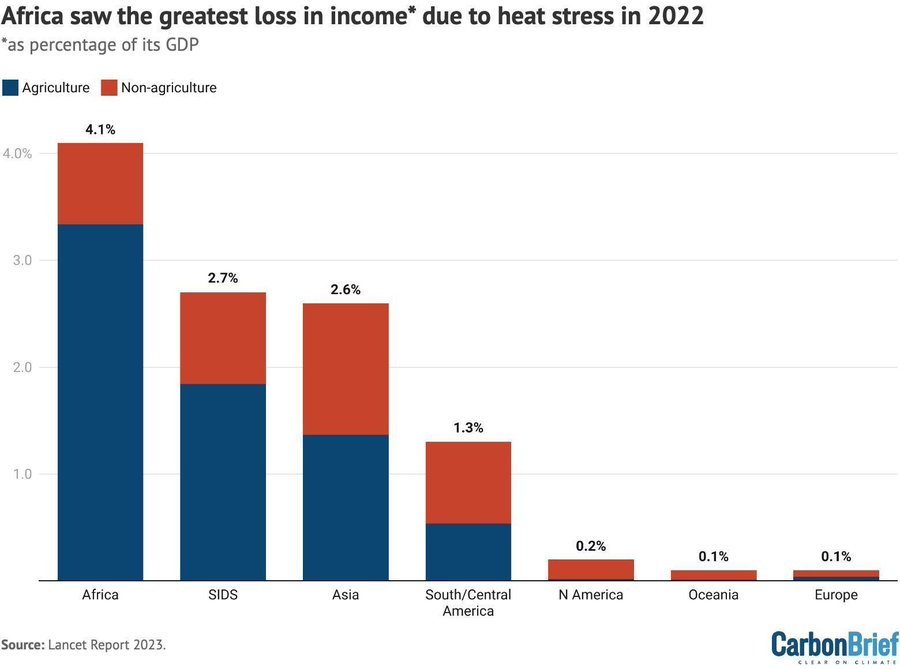 Or so CarbonBrief tells me. And it seems entirely plausible, so I won't quibble their numbers.
Or so CarbonBrief tells me. And it seems entirely plausible, so I won't quibble their numbers.
But looking at some of their other pictures, you immeadiately see the problem: they're poor.
And so we immeadiately see that there are several possible solutions: reduce GW - but this isn't much of a solution, as the pic shows, even winding back three decades doesn't get you close to losing 0%; or stop being poor, which reduces the problem to negligible levels.
As a bonus, not being poor has other virtues, too. Perhaps you can think of some.
Oddly, CB doesn't much consider that option, instead perferring to whinge about "unjust transition". The reason they are poor is, of course, that their govt is shite; which is a consequence of the state of society, alas. But addressing the real problem is difficult, and entails saying things that people don't like saying nowadays.
BTW, somewhere - but I doubt I can find it now1 - was talking about ye traditionale "GDP declines with increasing T" stuff, and quibbling its stats. But never mind the details, the interesting bit was that even if you took the stats unquibbled, as well as the strong "hot countries" T-up-GDP-down correlation, there's a weak T-up-GDP-up correlation in cold countries. But because cold countries dominate global GDP, the overall effect of T up is GDP up (possibily not-stat-sigly). I'm reminded of that by the "* as percent" qualifier in the pic above.
Notes
1. Temperature Shocks and Economic Growth: Comment on Dell, Jones, and Olken by David Barker.
Refs
2023-11-09
Reporting of yer conflict
 I've noticed that the Rafah crossing between Gaza and Egypt is often described as "closed", rather than "closed by", as though it had a mysterious mind of its own. Which of course it doesn't. For example yer Beeb sayeth: "the Rafah border crossing (from Gaza into Egypt) is today closed" but doesn't say whodunnit. A bit later they say "Rafah border crossing is still closed this morning. Hamas say they want more injured people to be allowed out of Gaza through the crossing before more foreign citizens are allowed to leave" which would imply that it is Hamas that is keeping people prisonner in Gaza; if so, it isn't clear why yer Beeb wouldn't just say so. Instead of endless flows of repetitious "news" I'd kinda like it if they could get their reporters to actually find out who is keeping it shut; it would appear quite important.
I've noticed that the Rafah crossing between Gaza and Egypt is often described as "closed", rather than "closed by", as though it had a mysterious mind of its own. Which of course it doesn't. For example yer Beeb sayeth: "the Rafah border crossing (from Gaza into Egypt) is today closed" but doesn't say whodunnit. A bit later they say "Rafah border crossing is still closed this morning. Hamas say they want more injured people to be allowed out of Gaza through the crossing before more foreign citizens are allowed to leave" which would imply that it is Hamas that is keeping people prisonner in Gaza; if so, it isn't clear why yer Beeb wouldn't just say so. Instead of endless flows of repetitious "news" I'd kinda like it if they could get their reporters to actually find out who is keeping it shut; it would appear quite important.While we're on this, yer Beeb also say War crime claims: Volker Türk, the UN commissioner for human rights... Some context: The rules for war, which are spelt out in the Geneva Conventions, prohibit hostage taking, and say countries engaged in conflict "may not deport or forcibly transfer the civilian population of an occupied territory". But this isn't right. The actual text is Parties to an international armed conflict may not deport or forcibly transfer the civilian population of an occupied territory, in whole or in part, unless the security of the civilians involved or imperative military reasons so demand (my bold). Omitting the final qualifier is dishonest. By contrast, taking of hostages is unequivocally a crime.
I also have a hard time taking displacing people quite as seriously as the "war crime" people do. I'm sure these people don't want to be displaced, and neither would I, but it is a far less serious matter than deliberately killing civilians. I'd rather be displaced a hundred times than killed once.
Since I've been tasteless enough to use the image I have: I think the recent habit of prolonging wars is bad, and it is better to let one side win. Hence calls for ceasefires or pauses1 in the Israel-Hamas war don't make sense and will likely lead to greater suffering. Also, per Hobbes, you're only allowed to rebel if you have a realistic chance of succeeding.
Update: What is happening at Gaza’s al-Shifa hospital and why?
The Graun is fairly typical of the abysmal state of reporting. Hamas, and carefully selected doctors at the hospital, swear blind that there are no Hamas in there. Oooohhh no indeed not. And yet mysteriously the Israelis are finding it hard to get in. Why don't they just walk in by the front door? For the obvious reason: the Hamas folk inside would shoot at them. Why isn't this obvious to the Graun and a great many other people? Because the bias of their world view is so strong2.
2023/11/15: the stupidity of some of the old fat white dead men is... well, I'd like to say astonishing, but in fact I'll say entirely predictable. For example, from the FT: International aid agencies expressed alarm at the Israeli incursion into al-Shifa. “Hospitals are not battlegrounds,” said Martin Griffiths, the UN aid chief. “The protection of newborns, patients, medical staff and all civilians must override all other concerns.” FFS you clown: it is definitely not true that "The protection of all civilians must override all other concerns", you know this very well, its part of the "rulez" of war. But more importantly, once the Israelis are in there, the patients and staff and evacuees are all safe, as long as Hamas doesn't shoot them.
Al-Jazmagi has a go at answering "Why is Gaza’s al-Shifa Hospital so important for the Israeli army?" in a way that avoids the obvious answer: they propound the symbol-of-resistance type narrative. But this is a dubious idea, and even they are forced to answer "Hamas", although they do it right at the end in the hope you won't read that far.
Update: forced relocation
People in warm safe comfortable houses like the UN hate what they call forced relocation; e.g. this press release. But what do Gazans on the ground think? We don't need to ask them, because we can see the walls that the Egyptians are building, so the answer is clear: they would very much like to relocate.
Notes
1. As if to prove me wrong, The US says Israel will begin to implement four-hour military pauses in areas of northern Gaza each day to allow civilians to flee. But firstly, that text is deceptive: the "pauses" referred will not "begin", they have already begun, and had when I wrote the above. The US is saying that for its own internal political reasons, post-announcing something already happening as though it was a success of theirs. A brief apuse such as that, over a route out, does indeed make sense. Note that there isn't the least hint of a response from Hamas, who offer no corresponding pause in their own fighting.
2. (belatedly: 2024/04): Al-Shifa Hospital and the crisis of the West - Spiked (arch).
Refs
* My comment at Jus in Bello by David Henderson. To which (2023/11/21) a belated followup here: given that innocent Palestinians and Israelis are morally equivalent (modulo slight quibbles about Hamas only being able to survive because it has popular support), then the Israeli hostages should not be the Israel's primary concern (prompted by this which suggests secondary-is-bad); just as they accept some regrettable civilian Palestinian deaths, they accept some regrettable Israeli civilian deaths.
* The two-state solution is still best. Actually I think allowing the Pals to emigrate is best, but no-one seems to like that; possibly not even the Pals themselves, so trapped are they in their grievances.
* Arf: Turkish MP who collapsed after saying Israel will ‘suffer Allah’s wrath’ dies.
2023-11-03
Care less
 Following my acclaimed analysis of how I came to peace with the world, I feel moved to offer advice to the world: care less.
Following my acclaimed analysis of how I came to peace with the world, I feel moved to offer advice to the world: care less.Notes
1. My pic shows Magdalene, winner of Uni Fours, by five seconds over Cauis. Stroke's head-on-one-side posture is quite endearing.
Refs
* Keep your identity small - Paul Graham.
* File:London anti-war protest banners; File:Stop the war- American eagle.
*Book review: The Lions of Al-Rassan.
* ...the greater part of the population is not very intelligent, dreads responsibility, and desires nothing better than to be told what to do. Provided the rulers do not interfere with its material comforts and its cherished beliefs, it is perfectly happy to let itself be ruled. Quote from Aldoux Huxley.
* JEB: UK Covid-19 Inquiry.
2023-10-27
They call her Natasha when she looks like Elsie
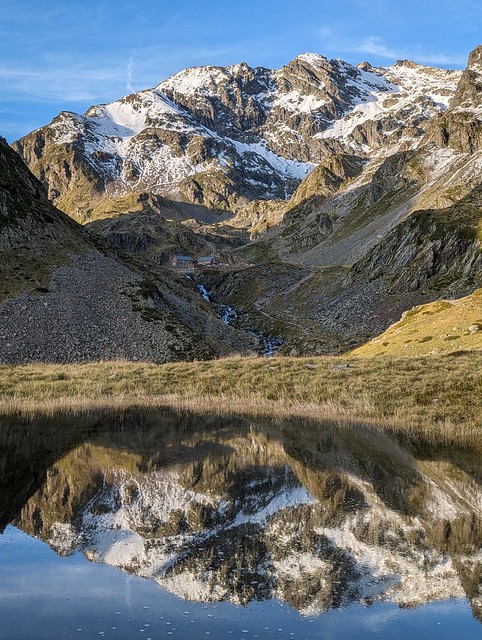 "The exception proves the rule" is a well-known phrase with more than one meaning; the one I take uses "prove" in the sense of "test". In maths or science of software this makes sense: edge and corner cases are useful: my software must work given any legal but unlikely input, and must fail in defined ways if given illegal input.
"The exception proves the rule" is a well-known phrase with more than one meaning; the one I take uses "prove" in the sense of "test". In maths or science of software this makes sense: edge and corner cases are useful: my software must work given any legal but unlikely input, and must fail in defined ways if given illegal input.It isn't so obvious in whifflier domains such as morality; hence the enduring popularity of talking about The Trolley Problem, wherein we are faced with a moral dilema well out of the bounds of any experience1. Morality is custom (update: see-also The Foundations of Morality) and so things well outside experience and therefore custom aren't subject to our moral intuitions.
This smacks once again of the softer sciences thoughtlessly aping the harder ones. If there genuinely are strict laws, then testing them with edge cases makes sense. If there aren't, trying to interpret out-of-bounds information within your (admittedly unclearly-)bounded framework will only confuse you.
Even less sensible is the attempt to think about TTP in the context of Implications for autonomous vehicles. No-one is going to write their software in a way that the question comes up.
Refs
* (I Don't Want to Go to) Chelsea.
* Philosophy of Physics Seminar: Sabine Hossenfelder (Munich Center for Mathematical Philosophy): 'Superdeterminism – The Forgotten Solution'
* The FTC’s Confused Case Against Amazon.
* In talking about The Ethical Case for a Siege of Gaza, Richard Hanania says that Individual morality does not transfer to geopolitical issues. This is consistent with what I'm saying here.
Notes
1. This also doesn't begin to cover what people would do in practice if faced with such problems. And in practice they can't be: the conditions are not real-world.
2023-10-22
Après ma mort, je ferai tomber une pluie de roses

Aristotle's Physics
There is quite a lot of words in the Physics. In a way, that's surprising: my mental image of those days is that paper3 wss in short supply, so you'd expect authors to have thought carefully before writing and to have compressed their work. Instead, A does the reverse: is discoursive and repetitive and doesn't follow a clear sequence. In this - as with the Politics - one gets the impression of a poorly edited collection of lecture notes. What it doesn't read like is ideas that have survived testing by rigourous dialectic.
Perhaps the greatest virtue of the work is as an example: that something that has survived for a long time can still be completely wrong, and yet still be defended. Consider what other ideas we see in the world today are similar. Of course, part of the problem is that anyone inclined to study this stuff deeply is going to be in sympathy with the material; no-one is going to waste much time ripping it to shreds. So why - I hear you ask - am I bothering? Well I've had these volumes on my shelves for many years now, and the time has finally come to finish reading and dispose of them.
Like say Hippolytus or Iphigenia in Tauris this comes into the "it lasted 2,000 years so there must be something worth while in it" but unlike them it is not literature; and it has not fared well. In the following I shall assume that the (English) words I'm reading have captured the original meaning of the text, despite the gulf that separates us; given the contortions that his translators and interpreters have gone through, I think it likely that I'm getting his best shot, or perhaps better than.
A discusses, let us say, motion. And he is smart enough to try to abstract; he is not interested in the motion of any individual ox-cart. Unfortunately, he abstracts all the way to abstraction; which I can best explain by comparing to, say, Galileo's experiments with rolling spheres down inclined planes. That abstracted to a concrete reality, and so was able to learn something, by observing how very simple entities behave. A abstracts out everything but movers and moving, and so is unable to learn anything.
A is interested in both the real world - or at least, in an abstract version thereof - and in the world of mathematics. Unfortunately he rarely distinguishes the two, or says which any given discussion appertains to; so much so that I doubt he has the distinction clearly in his mind. He is, however, aware that there is a distinction2.
In trying to think about how to Do Physics, A starts well Hence, in advancing to that which is intrinsically more luminous and by its nature accessible to deeper knowledge, we must needs start from what is more immediately within our cognition, though in its own nature less fully accessible to understanding. Now the things most obvious and immediately cognizable by us are concrete and particular, rather than abstract and general; whereas elements and principles are only accessible to us afterwards, as derived from the concrete data when we have analysed them. So we must advance from the concrete whole to the several constituents which it embraces; had he stuck to this, he would have fared much better. That's book I chapter I; chapter II starts off wondering how many "principle"s or "primary constituents" there are; attempting to translate this into ModernSpeak, it seems likely that he is wondering how many elements there are (rather than fundamental particles or states of matter) but - characteristically - his discussion is so unanchored by reality that one cannot really tell; he is already lost, and doesn't know it. He deduces that there must be either one, or finitely many, or infinitely many; after that he bogs down; then chapter VI concludes It is clear, then, that there must be more than one element or principle, and that there cannot be more than two or three. But, within these limits, the decision as between two and three presents great difficulties. This is based on "logic" along the lines of we need a pair of antithetical qualities; and (for the third, if needed) they need something to act on. So alas despite his declared intent to start with reality he falls at the first hurdle, and is reduced to being either Wrong, or perhaps Not Even Wrong. To the obvious rebuttal (which will come up time and again) "but in those early days it was really hard to know anything" comes the obvious answer: yes, it was. And so A, if honest, would have concluded that he simply didn't know and couldn't say anything useful on the topic. To some extent, supported by the end of book I, I believe that A was in this section merely surveying other opinions of the time, or felt himself unable to avoid opining. And sadly book II chapter I begins by stating that the elementary substances are earth, fire, air and water; see previous comments re badly edited lecture notes. Nothing else of interest appears in book II. I should perhaps note that there's quite a lot of stuff that my eyes just slide off... all the verbiage about causes for example; he does love classifying things, even if he has to make them up to do so.
Book III begins by defining motion; I took the piss out of that some years ago and don't feel much more merciful now. His problem is not realising that some things are better left undefined, as Newton did with time; we all know what it is (errm) so wrapping a pile of complicated words around a simple idea doesn't help; see-also Popper. That said, he is also covering too broad a scope; had he restricted himself to physical motion of inanimate objects he might have got along better.
Chapter IV begins to talk about infinity; but in the context of Nature (and thus, implicitly, not Maths).
[I'm fairly sure I intended to write more, but realised that it was all drivel anyway, and badly organised at that. I did Aristotle and the continuum before.]
Refs
* Paul Graham: how to do philosophy.
* Russell on Aristotle's Politics5.
* My Left Kidney - ACX.
Notes
1. Although to be fair, generally not about his Physics. The sort of defensive thing you can expect supporters to say about the Physics is along the lines of What, then, are we to expect from the Physics ? Something that is still of philosophical interest; very much that is of historic interest and that has entered deeply into the texture of our language; much of purely intellectual interest and bracing gymnastic; but also much that is of vital significance in relation to that borderland between physical and metaphysical thought where mathematics and philosophy meet, which I quote from the Loeb intro. Notice that they cannot even begin to mention that so much of it is wrong.
2. From book II chapter II: we have next to consider how the mathematician differs from the physicist or natural philosopher; for natural bodies have surfaces and occupy spaces, have lengths and present points, all which are subjects of mathe matical study. And then there is the connected question whether astronomy is a separate science from physics or only a special branch of it; for if the student of Nature is concerned to know what the sun and moon are, it were strange if he could avoid inquiry into their essential properties; especially as we find that writers on Nature have, as a fact, discoursed on the shape of the moon and sun and raised the question whether the earth, or the cosmos, is spherical or otherwise. Physicists, astronomers, and mathematicians, then, all have to deal with lines, figures and the rest. But the mathematician is not concerned with these concepts qua boundaries of natural bodies, nor with their properties as manifested in such bodies. Therefore he abstracts them from physical conditions; for they are capable of being considered in the mind in separation from the motions of the bodies to which they pertain, and such abstraction does not affect the validity of the reasoning or lead to any false conclusions.
3. Or equivalent.
4. Descartes is lead to this error by his idea that the "essential" property of a given object is its extension in space, which causes him to think in these terms; presumably, an indivisible object would have a property-in-itself that wouldn't fit into his schema. In turn this leads him to fail to get to momentum, despite some promising thoughts in that area. But analysing his errors individually isn't really interesting; my point rather is that there are endless ways of going wrong; you will always fall off the knife-edge of truth, unless you have something - in the case of physics, reality - to correct you.
5. Russell on Aristotle's logic: I conclude that the Aristotelian doctrines with which we have been concerned in this chapter are wholly false, with the exception of the formal theory of the syllogism, which is unimportant. Any person in the present day who wishes to learn logic will be wasting his time if he reads Aristotle or any of his disciples.
2023-10-20
Country capture
 Regulatory capture is a familiar concept, but "Country capture" in the sense that I mean it doesn't seem to be. State capture exists, but as a different concept. Country capture is when the govt has acquired the people. I'm prompted by the Economist's Tuvalu plans for its own disappearance (arch), where Tuvalu is (nominally), as the headline says, planning to keep going even if it physically disappears.
Regulatory capture is a familiar concept, but "Country capture" in the sense that I mean it doesn't seem to be. State capture exists, but as a different concept. Country capture is when the govt has acquired the people. I'm prompted by the Economist's Tuvalu plans for its own disappearance (arch), where Tuvalu is (nominally), as the headline says, planning to keep going even if it physically disappears. Why would you do that? Obviously, if you're the leader of a country and would like to stay in power, you might do that. And yet no (democratic) leader is likely to stay in power for long enough for it to matter. Another possibility is that this is just PR wank, as a means to draw-attention-to-your-sad-plight kinda gumpf. As TE says, part of the plan is The government is especially keen to make explicit that it would expect to retain its claim on the waters surrounding present-day Tuvalu, but this isn't obviously a good idea either: why would Tuvalu manage them any better than those who might inherit them?
Instead, think of it from the point of view of the people of the country, which the govt is at least supposed to pretend to be serving. If the country vanishes, the people will be best served by moving somewhere else. Rather obviously. "preserve cultural traditions online" as Tuvalu pretends to be considering is drivel, founded upon the idea that natioanlism is a good idea, which it isn't. Think people, not countries.
The other obvious example of this is the poor benighted Palestinians, captured by Hamas and Fatah. Who would be far better off if they were just Human Beings, whereupon they could go to some other country and lead productive and useful and fulfilling lives, instead of locking themselves into their forebears stupid conflicts.
My pic shows a few days walking around Vallouise. Full write-up to follow.
Refs
* My Book List by Bryan Caplan. You'll love it. Or The Identity of Shame.
2023-10-11
The Struggle
 Whilst mumbling in our beer about the failings of the world, Tom bemoaned the state of the blogging game. Which brings some thoughts to mind:
Whilst mumbling in our beer about the failings of the world, Tom bemoaned the state of the blogging game. Which brings some thoughts to mind:With success comes power and great success has been given me
And with great power comes great fuckability.
(The Struggle, by Scroobius Pip, as you doubtless recognise). I make no claims in that direction, indeed I am thinking of the opposite: with great lack of reach, comes great lack of responsibility.
By which I mean that I have come to terms with the world. A great many stupid, pointless, cruel, horrible things have happened, are happening, and will happen in the future1. In many cases far better outcomes could be achieved with little more that a small willingness to compromise, a slight ability to sift evidence and make accurate rather than partisan evaluations; and a whole host of other tiny trivial improvements that just won't happen.
I don't think I ever blogged with much hope of being listened to2. When I read Xitter posts of those who very much do want to be listened to it all seems rather desperate and most often doomed, and I'm certainly not going to make the attempts to shout that they do. The world has far too many competing voices searching for ears, and far too many of the people who do listen are listening for entertainment purposes only, not because they wish to have their prejudices challenged or corrected, or even wish to think.
So blogging is really only to have an interesting conversation. That doesn't always work, but at worst I'm having a conversation with my future self; and those who do comment here are always welcome, even if I don't always reply in the most temperate of terms. I write what I think is true, but I don't feel any obligation to temper my message into ear-shaped portions or strive to avoid offending fools.
Notes
1. For example, did I mention my brilliant solution to the Palestinian Problem? The Palestinians should surrender. They'd be far better off as second class citizens of Israel than they ever could be as even first class citizins of a Free Palestine, even if that were ever to come into existence. Self-determination is over-rated. Yes, I know there is no chance of this happening.
2. I've said this before, I find; see this comment on Yet more Exxonknew drivel.
Refs
* My pic: Assyrian relief from the British Museum. Still amazingly good, after all these years.
* For those interested in The Bell Curve, some interesting graphs from Cremieux on Xitter. Here is the male / female comparison: males are ~3 times as represented as females at IQ 140, but also at IQ 60 (note that these are SAT scores converted to IQ).
* The Grave Evil of Unemployment / Intellectual Autobiography of Bryan Caplan.
* On the inefficient economics of US slavery. Note that while the rest is interesting, I don't endorse it all.
* Conversations - ATTP. I notice, reading that, this post isn't quite what I thought it was... I was more talking about me being at peace with the world than specicially about blogging. ATTP mentions Substack, which is a thing; indeed I even have one but do nothing with it.
* Volokh: The Moral and Strategic Case for Opening Doors to Gaza Refugees.
2023-10-07
Gray the sinner
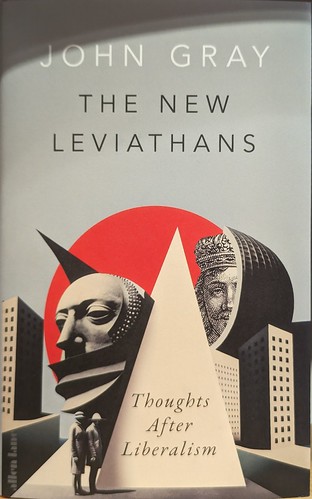
John Gray was tending towards despair a few years ago, but has now fallen. He not so much mourns what he considers the death of liberalism as revels in it, owning the libs or whatever. He is probably aiming at the wise-elder-statesman or -philosopher type of approach, but I think he is more an old man mumbling into his beer bemoaning the young folks and their ways.
His analysis of the death is weak; indeed he largely simply assumes it. Because to him it is so obvious; but since I'm not willing to grant him so much, most of the rest falls apart for me. At least the bits I've read; I won't claim to have got far into it; I stopped around the Russia / China analysis.
But the "frame" he has chosen is Hobbes, and I can't dislike that, though I do dislike the use he makes of Hobbes and the interpretation he uses (and he thinks too much of Malthus). As to Hobbes on international relations, the answer is clear: without the Civil Sword to hold men in awe there is no peace, no compacts, and the concept of injustice does not apply.
Towards the start there are some quotes from John Aubrey's brief live of Hobbes. I like:
He had read much, if one considers his long life; but his contemplation was much more than his reading. He was wont to say that if he had read as much as other men, he should have known no more than other men.
There is a lesson in that for all of us. And for those who favour in-person debate:
He would say that he did not care to give, neither was he adroit at, a present answer to a serious query: he had as lief they should have expected an extemporary solution to an arithmetical problem, for he turned and winded and compounded in philosophy, politics, etc, as if he had been at analytical work. He always avoided, as much as he could, to conclude hastily.
Refs
* Liberalism’s obituarist: John Gray extends his dark critique of the modern world. Note the nice JCWBC framing though I don't think he is current there.
* A multitude of possibly unsatisfying answers to "why is it suddenly so hot?".
* Economists are not engaged enough with the IPCC says Ilan Noy, but "Economics is a purely quantitative discipline" is Shirley bollox.
2023-09-28
A summer away
 My pic shows a sunrise at Argeles-sur-Mer. I had a few days there, doing not very much, at the end of two months in France, having taken some unpaid leave.
My pic shows a sunrise at Argeles-sur-Mer. I had a few days there, doing not very much, at the end of two months in France, having taken some unpaid leave.2023-07-25
ClientEarth loses high court fight with Shell over climate strategy
 Sez the Graun, having previously drooled over the directors being personally sued. The ostensible reason for the lawsuit was that the directors were not acting in the best interests of the company, and that the claimants ClientEarth were therefore damaged. But this was obvious wank, and the ManInAWig seems to have spotted that. "the management of a business of the size and complexity of that of Shell will require the directors to take into account a range of competing considerations" is the right answer; and so just as in the much-heralded Alsup, the court isn't the right venue for solving these issues. In a way, it is great that our society is so rich that we can afford to pour money down the drain in this way; just as well there's no backlog of real judicial cases needing attention.
Sez the Graun, having previously drooled over the directors being personally sued. The ostensible reason for the lawsuit was that the directors were not acting in the best interests of the company, and that the claimants ClientEarth were therefore damaged. But this was obvious wank, and the ManInAWig seems to have spotted that. "the management of a business of the size and complexity of that of Shell will require the directors to take into account a range of competing considerations" is the right answer; and so just as in the much-heralded Alsup, the court isn't the right venue for solving these issues. In a way, it is great that our society is so rich that we can afford to pour money down the drain in this way; just as well there's no backlog of real judicial cases needing attention.Refs
2023-07-21
Abuse of non-linear
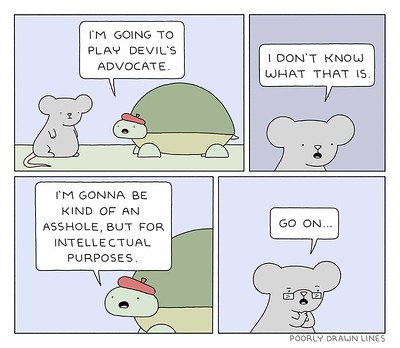 People are prone to saying things like "But impacts of climate change are different — they are non-linear" by which they mean scary, dangerous, worrying, problem-causing. But this is an abuse of terminology. A damage function that is, say, zero up to 2 oC and zillions above that is non linear; a damage function that is lots below 2 oC and zero above is also non-linear. But we only care about the first sort.
People are prone to saying things like "But impacts of climate change are different — they are non-linear" by which they mean scary, dangerous, worrying, problem-causing. But this is an abuse of terminology. A damage function that is, say, zero up to 2 oC and zillions above that is non linear; a damage function that is lots below 2 oC and zero above is also non-linear. But we only care about the first sort.In the real world, pretty well everything is non-linear. So saying that the impacts of GW are non-linear is trivial and uninteresting, in and of itself. People segue far too casually from "non-linear" (trivial) to "thresholds exist" (largely undemonstrated) to "we're passing those thresholds and terrible things are happening" (using insurance in the US as an example is a terrible idea because the markey is so heavily distorted by regulation and govt intervention that market prices often don't apply).
Thresholds are lovely things in simple theoretical models but I think less applicable to the real world. Everything is fuzzy, distributed: there are rarely absolute thresholds.
Other confusions
Is GW accelerating? Just recently Hansen asserts "We did not say that the global temperature record to date shows an acceleration of the global warming rate". And yet Hansen-2020 says "Record global temperature in 2020, despite a strong La Niña in recent months, reaffirms a global warming acceleration that is too large to be unforced noise". Perhaps the addition data after 2020 to 2023 shows a slow-down?
Refs
* Are the impacts of climate change non-linear?
* Neoclassical tipping points of no return.
* Economists greatly underestimate the price tag on harsher weather and higher seas. Why is that?
* ATTP's Abandoning the idea of an “optimal pathway” for climate policy makes me think of On getting out more. This is Jonathan Koomey's stuff; it is all so badly broken that it is hard to know where to start; see my comments chez ATTP.
* American universities have an incentive to seem extortionate. They are much cheaper than the “crisis of college affordability” suggests.
* Tipping points: AH likes good ones but doesn't like bad ones. Arf.
2023-07-17
UK installations of heat pumps 10 times lower than in France, report finds
 From the Graun: The UK is lagging far behind France and other EU countries in installing heat pumps, research has shown, with less than a tenth of the number of installations despite having similar markets. Only 55,000 heat pumps were sold in the UK last year, compared with more than 620,000 in France. Twenty other European countries also had higher installation rates than the UK.
From the Graun: The UK is lagging far behind France and other EU countries in installing heat pumps, research has shown, with less than a tenth of the number of installations despite having similar markets. Only 55,000 heat pumps were sold in the UK last year, compared with more than 620,000 in France. Twenty other European countries also had higher installation rates than the UK.The report continued: "We should try to understand why this difference is occurring". Ha ha, only joking, of course it didn't. Instead we get the familiar: "The MCS report, titled Heat Pump Rollout in France and the UK 2023, called on the government to make heat pumps mandatory for all new homes...". Why this insistence on force over understanding always?
On a similar topic, we have Michael Mann saying "Good doesn't defeat evil by trying to reason with it, normalize its underlying vices, or understand its ill-founded sense of grievance. Good defeats evil by defeating it. That was true of the American civil war. And that is true going into the 2024 U.S. election." Confusing war and elections is a bad idea. And convincing yourself that you don't need to understand "the other side" is a really bad idea. What does "defeating" your "opponent" mean? Even in a war, fighting to the death is the worst option; in an election, the metaphor just confuses you, because "winning" means to persuade your opponents supporters to support you instead. And you persuade them by, ideally, reasonning with them; and you do that most effectively by understanding them.
Refs
* Heat pumps: more than 80% of households in Great Britain ‘satisfied with system’?
* Book review: The Anome / The Brave Free Men / The Asutra.
* How Much Do Intellectuals Matter? Review of America's Cultural Revolution, by Chris Rufo.
Warming: increases in variability as well as mean?
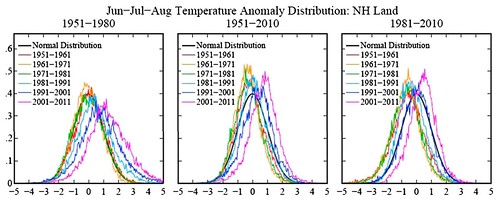 Global warming makes the globe get warmer on average, with - naturally enough - year to year variabililty. If you're interested in detecting GW then looking at the average is best, because its a nice stable statistic amenable to analysis. But it is also a pretty boring statistic, since it's gone up by ~1 oC in the last century, leaving people prone to respond "is that it? Temperature changed by 10 oC during the course of today", or whatever. So people tend to prefer to find something more exciting to talk about.
Global warming makes the globe get warmer on average, with - naturally enough - year to year variabililty. If you're interested in detecting GW then looking at the average is best, because its a nice stable statistic amenable to analysis. But it is also a pretty boring statistic, since it's gone up by ~1 oC in the last century, leaving people prone to respond "is that it? Temperature changed by 10 oC during the course of today", or whatever. So people tend to prefer to find something more exciting to talk about.Notes
2023-07-12
Morality is custom
 Since Law is custom, and morality is a sort of localised short-range-interaction law, it follows that morality ought to be custom too. Having thought and written that, it seems uncontroversial; people are used to the idea that morality is customary.
Since Law is custom, and morality is a sort of localised short-range-interaction law, it follows that morality ought to be custom too. Having thought and written that, it seems uncontroversial; people are used to the idea that morality is customary.This is not the same as morality-is-arbitrary, which people sometimes assert. There is a not-clearly-defined ground of morality necessary for a society to be stable enough to last long enough to develope customs1, 2. If you decided to assert that "theft is morally acceptable" you wouldn't last long, even if your law prohibited theft.
Refs
* On morailty, 2008. Not really satisfactory, because I'm not distinguishing L from M, but the direction is correct.
* The Case for Libertarian Friendliness.
* Human Deaths from Hot and Cold Temperatures and Implications for Climate Change (Patrick Brown, Breakthrough Institute) via RP.
* Natural Variability, Attribution and Climate Models #6 - Science of Doom.
* The Foundations of Morality.
Notes
1. Hence the fairly common assertion that "without religion, you have no morality" is wrong.
2. See-also my Book Review: The Righteous Mind.
2023-07-06
Law is custom
 I have frequent need to say "law is custom" and yet the post I use to link those words to - Hayek vs Hobbes and the theory of law - isn't the right one, even if it is in the right direction. What I want is a more explicit reference to James Coolidge Carter's "Law: Its Origin Growth and Function". I recommend that you read it.
I have frequent need to say "law is custom" and yet the post I use to link those words to - Hayek vs Hobbes and the theory of law - isn't the right one, even if it is in the right direction. What I want is a more explicit reference to James Coolidge Carter's "Law: Its Origin Growth and Function". I recommend that you read it.Downdate: what I wrote in 2018
2025/06: And public opinion
Public opinion bolsters judicial action in part because court decisions do not enforce themselves. Judges have little direct coercive authority and must rely on public support and the cooperation of officials in other branches of government. Such cooperation and support is more likely if a ruling has substantial public approval. Most judges, especially those on the Supreme Court, are well aware of this connection.
Refs
2023-07-01
Gay cakes part two: Gay websites
 But not Grindr or any of that stuff. No, this is the Supremes weighing in on whether people can be forced to make things they don't want to make. And the answer is no, which is the correct answer, and I think for the correct reasons, too. Read a more sober analysis at Supreme Court rules website designer can decline to create same-sex wedding websites.
But not Grindr or any of that stuff. No, this is the Supremes weighing in on whether people can be forced to make things they don't want to make. And the answer is no, which is the correct answer, and I think for the correct reasons, too. Read a more sober analysis at Supreme Court rules website designer can decline to create same-sex wedding websites.